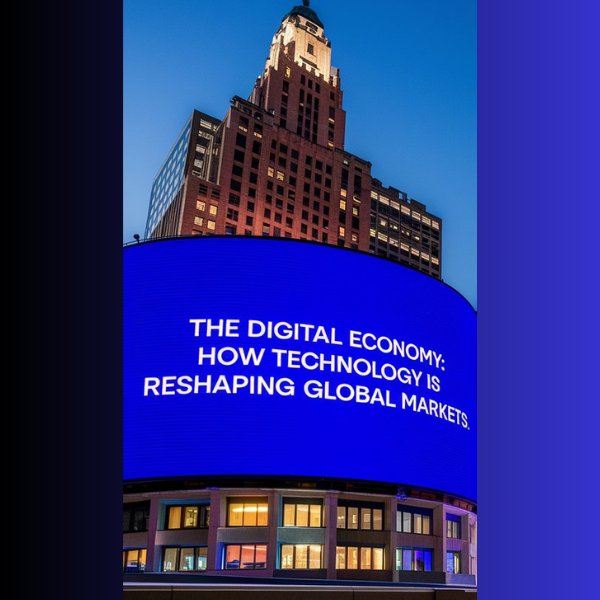The digital economy is revolutionizing the way businesses operate, creating new markets, and redefining traditional industries. Driven by rapid advancements in technology, this transformation is reshaping global markets, enhancing connectivity, and enabling businesses to operate more efficiently. From e-commerce to artificial intelligence (AI) and blockchain, the digital economy is the driving force behind modern economic growth. In this comprehensive guide, we’ll explore how technology is shaping the digital economy and what businesses must do to stay ahead in this evolving landscape.
The Rise of the Digital Economy
The digital economy refers to economic activities that leverage digital technologies to create, distribute, and consume goods and services. With the proliferation of the internet, cloud computing, big data, and mobile technology, businesses have unprecedented access to global markets and consumers.
Key Drivers of the Digital Economy
Several technological innovations have fueled the growth of the digital economy, including:
- The Internet and Connectivity: High-speed internet and widespread mobile penetration have made digital transactions and communications seamless.
- Big Data and Analytics: Businesses harness vast amounts of data to make data-driven decisions, personalize customer experiences, and optimize operations.
- Artificial Intelligence (AI) and Automation: AI-driven technologies are transforming industries by automating processes, improving decision-making, and enhancing customer interactions.
- Blockchain Technology: Decentralized finance, secure transactions, and smart contracts are revolutionizing how financial transactions and record-keeping are conducted.
- E-commerce and Digital Payments: The rise of online marketplaces and digital payment platforms has facilitated cross-border transactions and consumer accessibility.
How Technology is Reshaping Global Markets
1. E-commerce and Retail Disruption
E-commerce has transformed the retail landscape, enabling consumers to shop from anywhere in the world. Traditional brick-and-mortar stores are increasingly shifting to omnichannel strategies, combining physical and digital storefronts. Companies like Amazon, Alibaba, and Shopify have set new standards in convenience, personalization, and logistics.
Key trends in e-commerce:
- Growth of direct-to-consumer (DTC) brands
- Expansion of same-day and drone delivery services
- Use of AI for personalized recommendations
- Integration of augmented reality (AR) for virtual try-ons
2. Financial Technology (Fintech) Revolution
The financial sector has experienced significant disruption with the rise of fintech companies offering digital banking, peer-to-peer lending, cryptocurrency, and contactless payments. Traditional banks are now leveraging AI and blockchain to enhance security, automate processes, and improve customer experience.
Fintech innovations driving the economy:
- Mobile payment platforms (PayPal, Venmo, Apple Pay)
- Decentralized finance (DeFi) applications
- AI-powered fraud detection and risk assessment
- Digital-only banks and neobanks
3. Remote Work and the Gig Economy
The COVID-19 pandemic accelerated the adoption of remote work, further fueling the gig economy. Platforms like Upwork, Fiverr, and Toptal have enabled a global workforce to offer specialized services remotely, changing traditional employment structures.
Impact on businesses and workers:
- Increased demand for digital collaboration tools (Zoom, Slack, Microsoft Teams)
- Shift towards freelance and contract-based work
- Need for companies to adopt remote work policies and cybersecurity measures
4. Artificial Intelligence and Automation
AI is playing a pivotal role in reshaping industries by automating repetitive tasks, improving decision-making, and enhancing customer service. From chatbots to predictive analytics, AI is driving efficiency and innovation.
Industries leveraging AI:
- Healthcare: AI-powered diagnostics and robotic surgery
- Retail: AI-driven inventory management and demand forecasting
- Marketing: AI-enhanced consumer insights and ad targeting
- Manufacturing: Smart automation and predictive maintenance
5. Blockchain and Decentralization
Blockchain technology is revolutionizing supply chains, finance, and data security. By offering a decentralized, tamper-proof ledger, blockchain enhances transparency and efficiency in transactions and business operations.
Use cases of blockchain in the digital economy:
- Secure and transparent supply chain tracking
- Smart contracts for automated business agreements
- Decentralized finance (DeFi) platforms disrupting traditional banking
- Non-fungible tokens (NFTs) reshaping digital ownership
Challenges and Opportunities in the Digital Economy
Challenges:
- Cybersecurity Risks: With increased digital transactions comes the heightened risk of cyber threats, data breaches, and fraud.
- Regulatory and Compliance Issues: Governments worldwide are working to establish regulations for fintech, AI, and data privacy, creating complexities for businesses.
- Digital Divide: Unequal access to technology creates disparities in opportunities for businesses and consumers in developing nations.
- Workforce Disruptions: Automation and AI may displace traditional jobs, requiring workforce reskilling and adaptation.
Opportunities:
- Global Market Access: Businesses can tap into international audiences, expanding revenue streams beyond physical locations.
- Efficiency Gains: Digital tools and automation reduce costs and improve productivity across industries.
- Innovation and New Business Models: Emerging technologies create new market opportunities for entrepreneurs and startups.
- Sustainability and Smart Cities: The digital economy supports green technologies, smart infrastructure, and resource efficiency.
The Future of the Digital Economy
As technology continues to evolve, the digital economy will expand into new frontiers, including:
- Metaverse and Virtual Reality (VR): Virtual economies and immersive digital experiences will redefine how people work, socialize, and transact.
- Quantum Computing: Advanced computing power will unlock new possibilities in cryptography, AI, and data analysis.
- 5G and IoT Expansion: Faster connectivity will enable smart cities, connected devices, and enhanced real-time applications.
- Ethical AI and Responsible Tech: Businesses will need to prioritize ethical considerations in AI, data privacy, and sustainability.
Final Thoughts
The digital economy is no longer a futuristic concept—it is the present and future of global markets. Technology is reshaping industries, enabling businesses to innovate, and providing consumers with unprecedented convenience and accessibility. Companies that embrace digital transformation, leverage emerging technologies, and prioritize cybersecurity and compliance will thrive in this dynamic landscape.
Understanding and adapting to these changes will be critical for businesses, policymakers, and individuals looking to capitalize on the opportunities presented by the digital economy. The key to success lies in staying informed, agile, and forward-thinking.
What steps is your business taking to adapt to the digital economy? Share your thoughts in the comments below!





